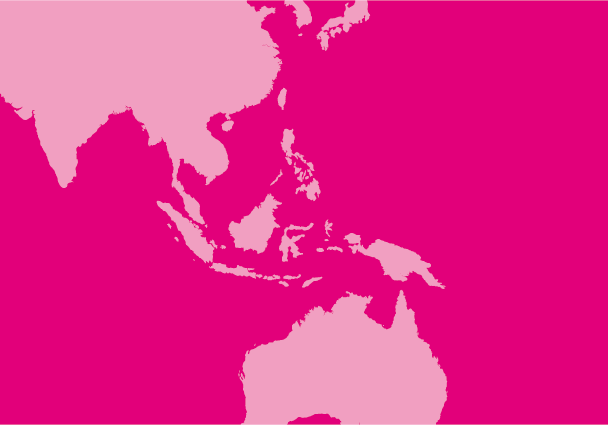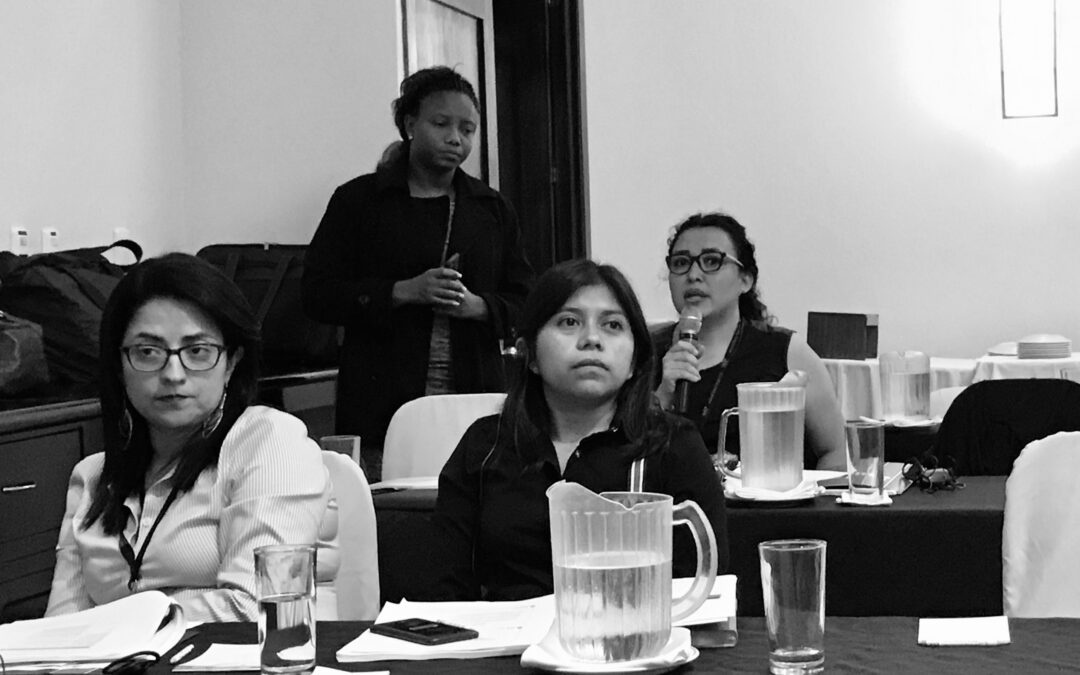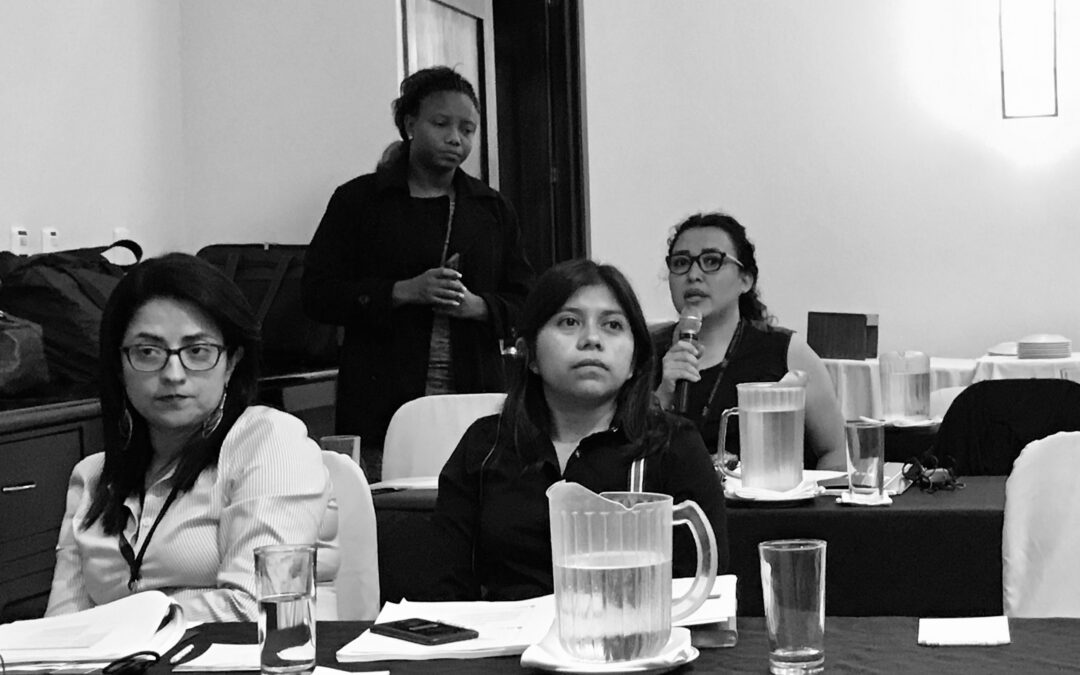
Jul 8, 2019 | Comunicados de prensa, Informes, Multimedia, Noticias, Publicaciones
Las autoridades venezolanas deben tomar medidas de inmediato para restaurar las instituciones democráticas y el funcionamiento del estado de derecho, lo que incluye disolver la Asamblea Nacional Constituyente y restaurar los poderes constitucionales de la Asamblea Nacional, dijo hoy la CIJ.
Sin lugar para la deliberación, el informe más reciente de una serie sobre derechos humanos y estado de derecho en Venezuela, aborda aspectos profundamente problemáticos con respecto a la creación, composición y funcionamiento de la Asamblea Nacional Constituyente de Venezuela, la cual actualmente detenta funciones legislativas, y su devastador efecto para el Estado de Derecho en ese país.
El reporte muestra que la Asamblea Nacional Constituyente, instalada el 4 de agosto en virtud un decreto ejecutivo del Presidente Nicolás Maduro, ha desplazado la autoridad de la constitucionalmente establecida Asamblea Nacional.
“La ANC fue creada unilateralmente por el Presidente, sin refrendación popular mediante un referendo, configurando una evidente violación a la Constitución, y desde entonces ha actuado como un cuerpo sin control o respeto por el estado de derecho,” dijo Sam Zarifi, Secretario General de la ICJ.
Inicialmente creada para redactar una nueva Constitución, la Asamblea Nacional Constituyente ha sido usada para usurpar funciones legislativas y así aprobar medidas de orden administrativo, electoral y legislativo en favor de la agenda del Poder Ejecutivo, establece el reporte.
El informe documenta cómo la Asamblea Nacional Constituyente adelantó elecciones presidenciales; levantó la inmunidad parlamentaria de diputados de la Asamblea Nacional para permitir su arresto y enjuiciamiento; designó a las autoridades de más alto nivel; y aprobó leyes discriminatorias que criminalizan la libertad de expresión y asociación.
Entre otras cosas, la CIJ recomienda a las autoridades venezolanas que tomen medidas para que:
- Cese el funcionamiento de la Asamblea Nacional Constituyente y se reestablezcan los poderes constitucionales de la Asamblea Nacional.
- Se permita a la Asamblea Nacional revisar los actos adoptados por la Asamblea Nacional Constituyente, a fin de dejarlos sin efecto total o parcialmente, de manera inmediata o condicional, en aras de preservar la seguridad jurídica.
Contactos:
Sam Zarifi: Secretario General de la CIJ; t +41 79 726 44 15; e sam.zarifi(a)icj.org
Santiago Martínez Neira: abogado consultor de la CIJ; e santiago.mn(a)gmail.com
Venezuela-Sin Lugar para la deliberacion-Publications-Reports- fact findings mission reports-2019-SPA (Informe, en PDF)
Video de un evento paralelo sobre la crisis de derechos humanos en Venezuela, organizado conjuntamente con Amesty International:
https://www.facebook.com/ridhglobal/videos/1206399322898690/

Jul 8, 2019
The Venezuelan authorities must take immediate steps to recover the country’s democratic institutions and the functioning of the rule of law, including disbanding the National Constituent Assembly and allowing the National Assembly to resume its Constitutional authority, the ICJ said today in a new report and at a webcast event.
No Room for Debate, the latest in a series of reports on human rights and the rule of law in Venezuela, addresses the deeply problematic aspects concerning the creation, composition and functioning of the National Constituent Assembly (NCA) of Venezuela, presently wielding legislative power, and its devastating effect on the rule of law in the country.
The report shows how the National Constituent Assembly, installed on 4 August 2017 pursuant to an executive decree by President Nicolás Maduro, has displaced the authority of the country’s constitutionally established legislature.
“The NCA was created unilaterally by the President, without popular endorsement through a referendum, in blatant violation of the Constitution, and ever since has acted in an unchecked manner and beyond the rule of law,” said Sam Zarifi, ICJ Secretary General.
Initially convened to prepare a new Constitution, the National Constituent Assembly has been used to usurp legislative functions in order to pass electoral, administrative and legislative measures in support of the Executive Branch’s agenda, the ICJ report says.
It documents how the National Constituent Assembly called early presidential elections; rescinded legislative immunity for National Assembly deputies to enable their arrest and prosecution; appointed top-ranking executive authorities; and adopted discriminatory measures that penalize freedom of expression and association.
Among several recommendations, the ICJ urges the State authorities to:
- Rescind the National Constituent Assembly and restore the Constitutional powers of the National Assembly.
- Allow the National Assembly to review the orders issued by the National Constituent Assembly, to render them totally or partially ineffective, immediately or conditionally, in the interest of ensuring legal certainty.
Contact:
Sam Zarifi, ICJ Secretary General, t +41 79 726 44 15 ; e sam.zarifi(a)icj.org
Santiago Martínez, ICJ Consultant; santiago.mn(a)gmail.com
Venezuela-No room for debate-Publications-Reports-Fact finding mission reports-2019-ENG (full report in PDF)
Watch the video (mostly in Spanish) of a side event on the human rights crisis in Venezuela, organized jointly with Amnesty International.
https://www.facebook.com/ridhglobal/videos/1206399322898690/

Jul 8, 2019 | News
The ICJ welcomes the report issued today by the United Nations Office of the High Commissioner for Human Rights (OHCHR) documenting human rights violations and abuses in Indian administered Kashmir and Pakistan administered Kashmir.
The ICJ called upon both India and Pakistan to take immediate measures to implement the Report’s main recommendations, and to hold security forces as well as non-state actors accountable for human rights violations and abuses.
The Report follows a June 2018 report that documented similar violations, as well as the widespread impunity for human rights violations by Indian security forces and armed groups allegedly supported by Pakistan. The Indian Government has rejected both reports as a violation of its “sovereignty and territorial integrity”. The Pakistan government has welcomed the report and called for the establishment of a United Nations Commission of Inquiry.
“It is unfortunate that India has again refused to acknowledge the facts set out in the OHCHR report, or to pledge action on its recommendations,” said Frederick Rawski, Asia Pacific Director for the ICJ.
“This is an opportunity for India, a member of the Human Rights Council, to lead by example. It can start by repealing the Armed Forces Special Powers Act and launching an investigation into rights abuses in line with international standards and the guidelines set out by the Indian Supreme Court,” he added.
The Report documents human rights violations by Indian security forces including extrajudicial killings, arbitrary detentions, unlawful custodial deaths, enforced disappearances, and ill-treatment and torture, including rape and sexual violence, in Indian-administered Kashmir.
According to the Report, based on data from civil society organization Jammu and Kashmir Coalition of Civil Society (JKCCS), 71 extrajudicial killings were allegedly committed by security forces in 2018 (for a total of 1081 between 2008 and 2018). Between 2016 and 2018, 1253 people have been blinded by pellet guns.
The Report highlights how the extraordinary powers granted to security forces by the Armed Forces (Jammu and Kashmir) Special Powers Act, 1990 has been wielded arbitrarily and led to near total impunity from prosecution. In addition, it documents human rights abuses committed by non-state armed groups in Indian-administered Kashmir including kidnappings, killings and rape.
The Report also documents rights violations in Pakistan-administered Kashmir, including restrictions on freedom of expression and opinion, assembly and association, and the abuse of vague and overbroad anti-terrorism laws in contravention of international human rights law.
The Report documents cases of arbitrary arrest by local authorities and intelligence agencies, including charging 19 activists with treason for organizing a rally in November 2018, and the arbitrary detention of 30 members of the Jammu Kashmir National Students Federation in March 2019 by Pakistani law enforcement. The Report notes the particular vulnerability of journalists to threats, harassment and arbitrary arrest.
“While we commend Pakistan for welcoming the Report, the fact remains that the Government has done little to prevent the continuation of human rights violations by its security forces, or to implement the recommendations of the previous report,” Rawski said.
“Pakistan must take action to hold perpetrators of rights violations accountable, and take action to end threats and violence targeted at human rights defenders and journalists,” he added.
The ICJ called on both Pakistan and India to grant unconditional access to the OHCHR and Special Procedures of the UN Human Rights Council, and to ensure that human rights defenders and journalists can carry out their work without threats or reprisals from security forces and non-State armed groups.
The ICJ also underscores the importance of the OHCHR recommendation that the United Nations set up an independent commission of inquiry into allegations of rights violations by all parties to the conflict.
The ICJ urged both the Indian and Pakistan governments to respect, protect and fulfill their international human rights obligations in Kashmir, to accept the Report’s findings and take immediate and effective action to implement its recommendations.

Jun 29, 2019 | News
Between 26 and 29 June 2019, in Guatemala City, ICJ and its partner, Fundación de Antropología Forense de Guatemala (FAFG), with the support of the Asociación Guatemalteca de Jueces por la Integridad (AGJI) and the Bufete de Derechos Humanos (BDH), undertook trainings of more than 12 judges and 20 prosecutors on the international law and standards that apply to the investigation of unlawful death and enforced disappearances.
The workshops were conducted as part of the project under the ICJ’s Global Accountability Initiative entitled, Promoting justice for extrajudicial killings and enforced disappearances in Colombia, Guatemala and Peru, supported by the EU European Instrument for Democracy and Human Rights (EIDHR).
Opening remarks were given by Tomás Pallás Aparisi, Head of Cooperation at the EU Delegation to Guatemala, Delia Dávila, Magistrate from the Supreme Court of Guatemala and Haroldo Vasquez, President of the Asociación Guatemalteca de Jueces por la Integridad AJGI.
Ramón Cadena, Director of the ICJ’s Central America Office, addressed the international law and standards that apply to the investigation and prosecution of unlawful death and enforced disappearances and their relevance to Guatemala. Edgar Pérez, director of Bufete de Derechos Humanos (BDH) discussed the situation of enforced disappearances in Guatemala and the value and applicability of international law and standards. Marco García, a representative of FAFG, outlined the role of forensic science in the investigation of unlawful death and enforced disappearances.
Kingsley Abbott, Senior Legal Adviser & Coordinator of the ICJ’s Global Accountability Initiative, provided an overview of the revised Minnesota Protocol on the Investigation of Potentially Unlawful Death (2016), which formed the core of the materials used at the workshops.
The ICJ took the opportunity of the workshops to visit the office of its partner, the Asociación de Familiares de Detenidos-Desaparecidos de Guatemala (FAMDEGUA) and meet with Justice Delia Marina Davila Salazar of the Supreme Court of Justice of Guatemala.
Contacts:
Kingsley Abbott, Senior Legal Adviser & Coordinator of the ICJ’s Global Accountability Initiative, email: kingsley.abbott(a)icj.org
Carolina Villadiego Burbano, ICJ Legal and Policy Adviser, Latin America, and Regional Coordinator of the Project, email: carolina.villadiego(a)icj.org

Jun 29, 2019 | Artículos, Noticias
Entre el 26 y el 29 de junio de 2019, en la Ciudad de Guatemala, la CIJ, junto con la Fundación de Antropología Forense de Guatemala (FAFG), y el apoyo de la Asociación Guatemalteca de Jueces por la Integridad (AGJI) y el Bufete de Derechos Humanos (BDH), llevó a cabo actividades de capacitación dirigidas a más de 12 jueces y 20 fiscales, acerca de los estándares internacionales que se aplican en la investigación de las ejecuciones extrajudiciales y las desapariciones forzadas.
Las actividades se llevaron a cabo en el marco del proyecto “Promoviendo justicia para ejecuciones extrajudiciales y desapariciones forzadas en Colombia, Guatemala y Perú”, bajo la Iniciativa Global de rendición de cuentas de la CIJ, y con el apoyo del Instrumento Europeo para la Democracia y los Derechos Humanos (IEDDH).
Las actividades contaron con la presencia de Tomás Pallás Aparisi, Jefe de Cooperación de la Delegación de la Unión Europea en Guatemala; Delia Dávila, Magistrada de la Corte Suprema de Guatemala; y Haroldo Vásquez, Presidente de la Asociación Guatemalteca de Jueces por la Integridad (AGJI).
En estas actividades, Ramón Cadena, director de la Oficina de Centroamérica de la CIJ, se refirió a la importancia de los estándares internacionales aplicables a la investigación y al enjuiciamiento de las ejecuciones extrajudiciales y desapariciones forzadas. Además, Edgar Pérez, director del Bufete de Derechos Humanos (BDH), analizó la situación de las desapariciones forzadas en Guatemala y el valor y la aplicabilidad de los estándares internacionales en el país.
Asimismo, Marco García, miembro de la FAFG, describió el papel de la ciencia forense en la investigación de estas graves violaciones a los derechos humanos. Finalmente, Kingsley Abbott, asesor legal senior y coordinador de la Iniciativa Global de Rendición de Cuentas de la CIJ, proporcionó una visión general acerca de los contenidos del “Protocolo de Minnesota sobre la Investigación de Muertes Potencialmente Ilícitas” (versión revisada de 2016).
La CIJ aprovechó la realización de estas actividades de capacitación para visitar a la Asociación de Familiares de Detenidos-Desaparecidos de Guatemala (FAMDEGUA) y reunirse con la jueza Delia Marina Dávila, de la Corte Suprema de Justicia de Guatemala.
Contactos:
Kingsley Abbott, asesor legal senior y coordinador de la iniciativa global de rendición de cuentas de la CIJ. Correo electrónico: kingsley.abbott(a)icj.org
Carolina Villadiego, Asesora Legal, América Latina, y coordinadora regional del proyecto. Correo Electrónico: carolina.villadiego(a)icj.org









